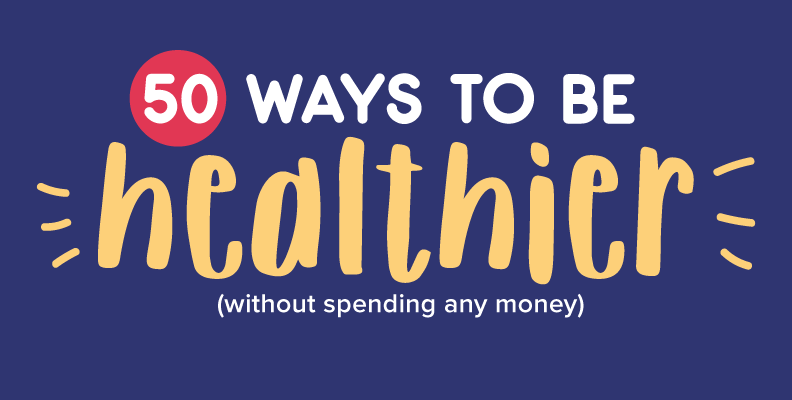Being healthy doesn’t have to cost a lot of money. Small changes to your routine can lead to big changes in your health. Tweaking your lifestyle in a few simple ways can improve the way you feel and the way you see your body.
It seems like everyone’s joined a gym in the last few years. But being healthy doesn’t need to involve making major changes that you might not be able to keep up; the best approach is to improve the daily habits you already have.
It starts the moment you get out of bed. You might not be ready to become a full-on yoga master, but a brief stretch before you go to work will do your body and mind a world of good. Stretching in the morning improves your blood supply from head to toe, delivering nutrients around your body. And it strengthens your muscles, which will make the rest of your new routine seem much easier.
At lunch, the change is simple: take your time! Experts have shown that paying attention to what you eat at lunch will make you feel less like snacking in the afternoon. If you work while you’re eating, or gobble your sandwich down in a hurry, you will literally ‘forget’ you ate it — at least on a subconscious level. You don’t need to extend your lunch break, as long as you are mindful towards what you’re eating.
And the final cheap, healthy thing to do before bed? Switch off your devices! Scrolling through the news or social media when you’re about to catch some z’s makes your mind more active just when you need to nod off. You need at least seven hours of quality sleep. This is when your body repairs its cells and tissues, and your hormones go to work fighting off infection and rebuilding your immune system.
Everything you do — big or small — has an impact on your health. To help you get started, we’ve created an infographic with 50 simple and inexpensive health improvement tips. There’s something new to try for every part of the day.
Good health is a privilege, but it’s one you can earn without investing time and money that you don’t have. Make a few positive tweaks in how you treat your body, and you should find yourself healthier, happier, and full of energy.

Sources
- UC Davis. Why Stretching is Extremely Important. shcs.ucdavis.edu
- Parretti, HM et al. (2015) Efficacy of water preloading before main meals as a strategy for weight loss in primary care patients with obesity: RCT. Obesity. 23(9)
- Mercola. (2012) Why a Cold Shower May Be More Beneficial for Health than a Warm One. fitness.mercola.com
- Lobo, V. et al. (2010) Free radicals, antioxidants and functional foods: Impact on human health. Pharmacogn Rev. 4(8)
- Johns Hopkins Medicine. Sunscreen and Your Morning Routine. hopkinsmedicine.org
- Stepanski, EJ. (2002) The effect of sleep fragmentation on daytime function. Sleep. 25(3)
- Future Work Center. (2015) You’ve got mail! futureworkcentre.com
- Chelleppa, SA et al. (2014) Photic memory for executive brain responses. PNAS 111(16)
- Harvard Health Publishing. (2011) Breaking the fast. health.harvard.edu
- Masicampo, EJ et al. (2011) Consider It Done! Plan Making Can Eliminate the
Cognitive Effects of Unfulfilled Goals. Journal of Personality and Social Psychology. - WebMD. 10 Tips to Improve Your Health at Work. webmd.com
- NHS. How to sit correctly. Nhs.uk
- Ariga, A. (2011) Brief and rare mental “breaks” keep you focused: Deactivation and reactivation of task goals preempt vigilance decrements. Cognition. 118(3)
- Shaw, G. Water and Stress Reduction: Sipping Stress Away. webmd.com
- Duke Human Resources. Benefits of Taking the Stairs. hr.duke.edu
- Yahoo Health (2015) Sitting With Your Legs Crossed? 4 Reasons To Stop — Now. yahoo.com
- Oliver, D. interviewing Shamban, A. (2017) Why You Should Stop Touching Your Face. huffingtonpost.co.uk
- Kõljalg, S. (2017) High level bacterial contamination of secondary school students’ mobile phones. Germs. 7(2)
- Hatfield, H. 7 Tips for Healthy Lunches While You Work. webmd.com
- Lewis, D. (2009). Galaxy Commissioned Stress Research. Sussex University, UK: Mindlab International.
- Aiello, AE. et al. (2008) Effect of Hand Hygiene on Infectious Disease Risk in the Community Setting: A Meta-Analysis. American Journal of Public Health.
- Kim, JE. (2015) Effects of Egg Consumption on Carotenoid Absorption from Co-consumed, Raw Vegetables. The American Journal of Clinical Nutrition. 22(1)
- Thøgersen-Ntoumani, C. et al. (2015) Changes in work affect in response to lunchtime walking in previously physically inactive employees: A randomized trial. The Scandinavian Journal of Medicine & Science in Sports. 25(6)
- Kahneman, D. 2011. Thinking, Fast and Slow. New York City, New York: Farrar, Straus and Giroux.
- Harvard School of Public Health. Carbohydrates and Blood Sugar. Hsph.harvard.edu
- Kix, P. (2011) Lunch Amnesia. nymag.com
- Mayo Clinic. Eyestrain. mayoclinic.org
- Jorde, R. (2008) Effects of vitamin D supplementation on symptoms of depression in overweight and obese subjects: randomized double blind trial. Journal of Internal Medicine. 264(6)
- Scalbert, A. et al. (2005) Polyphenols: antioxidants and beyond. The American Journal of Clinical Nutrition. 81(1)
- Pennebaker, JW et al. 2016. Opening Up by Writing It Down: How Expressive Writing Improves Health and Eases Emotional Pain. New York City, New York: Guilford Press.
- Brunt, VE. (2016) Passive heat therapy improves endothelial function, arterial stiffness and blood pressure in sedentary humans. The Journal of Physiology. 594(18)
- Okamoto-Mizuno, K. et al. (2012) Effects of thermal environment on sleep and circadian rhythm. Journal of Physiological Anthropology. 31(1)
- National Sleep Foundation. How to Wake Up Without An Alarm Clock. sleep.org
- Mark, G. et al. The Cost of Interrupted Work: More Speed and Stress. ics.uci.edu
- Lewis, D. (2016) Feeling Down? Scientists Say Cooking and Baking Could Help You Feel Better. smithsonianmag.com
- NHS. (2017) Avoid eating just before your bedtime, study recommends. nhs.uk
- Harvard Health Publishing. 2015. Improving Sleep: A guide to a good night’s rest. Boston, Massachusetts: Harvard Health Publishing.
- Glassman, K. (2013) Want to Sleep Better? Unplug First. health.usnews.com
- O’Donovan, G. et al. (2017) Association of “Weekend Warrior” and Other Leisure Time Physical Activity Patterns With Risks for All-Cause, Cardiovascular Disease, and Cancer Mortality. JAMA Internal Medicine. 177(3)
- Cohut, M. (2018). What are the health benefits of being social? medicalnewstoday.com
- Weatherford, A. (2017) Is Everyone Changing Their Pillowcase More Often Than Me? thecut.com
- Kõljalg, S. et al. (2017) High level bacterial contamination of secondary school students’ mobile phones. Germs. 7(2)
- Glynn, S. (2013) Music Benefits Both Mental And Physical Health. medicalnewstoday.com
- National Sleep Foundation. Is It OK to Sleep In on Weekends? sleep.org
- Lin, L. (2016) et al. ASSOCIATION BETWEEN SOCIAL MEDIA USE AND DEPRESSION AMONG U.S. YOUNG ADULTS. Depression and Anxiety. 33(4)
- Mayo Clinic Staff. Meatless meals: The benefits of eating less meat. mayoclinic.org
- WebMD. Alcohol Effects. Webmd.com
- Kivimäki, M. (2015) Long working hours and risk of coronary heart disease and stroke: a systematic
Embed This Image On Your Site (copy code below):






